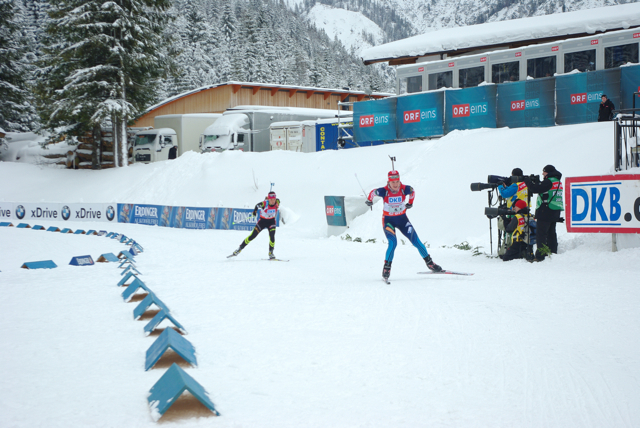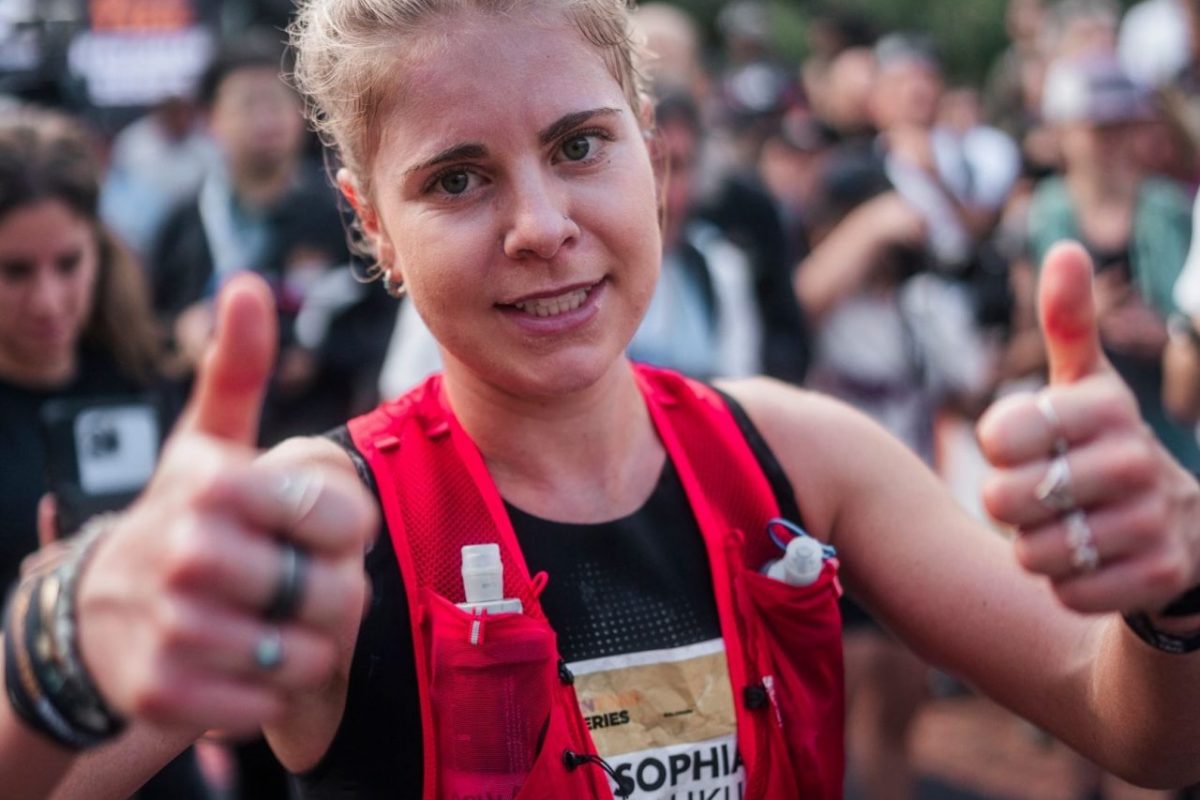
Yesterday afternoon, the International Biathlon Union (IBU) issued provisional sanctions to three athletes who had “A” samples which tested positive for a prohibited substance. The federation did not release much more information, stating that the athletes were from Russia and Lithuania but declining to name them or specify which banned substance had been detected.
The news came on the heels of other positive tests: last week, 12 Russian athletes in seven different summer sports failed doping tests. And just this week, Alexandra Gulyaev, a junior national champion in the 1,500 meter run on the track, also failed a test.
Today, more details came to light as the Russian news site R-Sport alleged that two of the three athletes were Russian, and that they were Ekaterina Iourieva and Irina Starykh. The IBU has not confirmed the athletes’ identities and stated that it will not do so until after the “B” samples have been tested, which should be in roughly a week.
Iourieva, a World Champion in 2008 has already served a doping ban after testing positive for recombinant erythropoietin (EPO) in 2009. While not naming names, IBU Vice President Ivor Lehotan did confirm to R-Sport that it was the second offense for one of the athletes involved.
Starykh has never had a positive test. She is currently Russia’s top female athlete in the World Cup total score, sitting in sixth position. Starykh won the Continental Championships sprint last season, and received a single World Cup weekend of starts after that. This season, she has shot into the spotlight, starting every World Cup race and earning two podiums. Only once did she finish outside the top 30.
While Starykh was named to Russia’s Olympic squad, Iourieva was left off of it.
Both women are trained by Vladimir Korolkevich. Russia has an unusual setup for its women’s team: it is split into two groups, the second of which is trained by Wolfgang Pichler, a German who made his name as the head coach of the Swedish team. If the names leaked by Championat are correct, then none of Pichler’s athletes are implicated. When he took the position in Russia, he issued strong statements against doping and swore not to tolerate it on his squad.
Just one week ago, Korolkevich, who previously coached the USSR, Slovenian, and Ukrainian teams before returning to Russia and initially working with Iourieva as she returned from her ban, was promoted to head coach. That meant that he would supervise Pichler, limiting the German’s influence over his own squad.
Although the Russian Biathlon Union (RBU) held an emergency meeting of their anti-doping committee today, there is no news of whether Korolkevich will retain his position.
Instead, the RBU responded to outrage over the positive tests by condemning the invasion of athletes’ privacy.
“The Russian Biathlon Union urges the media and fans to respect the rights of athletes and to respect international regulations of anti-doping organizations,” the committee said in a statement posted to their website. “… neither the national federation, nor any other organization… has the right to disclose information or comment on the details, give the names of athletes, or especially to adjudicate. Moreover, until the publication of official information no one has the right to call an athlete guilty of doping.”
The executive director of the Russian anti-doping agency, Nikita Kamaev, took no responsibility for the situation in comments to the Russian website Championat.
“At the end of the training cycle for the biathlon team, all of the athletes were clean,” he said.
Meanwhile, some Russians are alleging a conspiracy to smear the host nation of the upcoming Olympic Games. Among them are Sergei Tchepikov, who competed in an astounding six Olympic Games ranging from 1988 to 2006, and won two individual and four relay medals in biathlon.
“It’s strange that the results of samples that were taken in December were just announced now, just before the Olympics,” he told “Soviet Sport”. “Apparently, this was done in order to destabilize our team.”
While he could not spill any details, IBU President Anders Besseberg was quite forthcoming in an interview with Norwegian newspaper VG.
“It is no coincidence that they were tested,” he said. “In this case, we had been aware of these athletes for a long time. This is what it takes… it would be unfortunate if cheaters compete in Sochi. I am very pleased to weed them out of the system before the Olympics.”
Athlete Reactions
Other World Cup and Olympic-bound biathletes were quick to condemn the positive tests, taking to twitter and facebook, and in some cases the media.
Emil Hegle Svendsen of Norway told VG that he had been tested seven times in two weeks.
“It’s perhaps a bit much,” he said. “But I would rather that WADA test too much rather than too little.”
Canada’s Rosanna Crawford echoed his observation.
“I know how much our team is tested and I can only hope that every other nation is tested just as much,” she told FasterSkier.
Others simply vented their frustration.
“Iourieva again!” Canadian coach Roddy Ward tweeted. “… Nice clean up job Russia (not!)”
“I’m disappointed to hear about more positive doping tests in biathlon. But at least the cheaters are getting caught! #cleanitup” tweeted U.S. star Tim Burke.
The North American women’s teams, who had spent the winter competing against Iourieva and Starykh, also offered up their thoughts. In some ways, they said that a positive test wasn’t a complete shock.
“The epic revelations of doping in the cycling world during the past couple years have been eye opening for all endurance sports,” U.S. biathlete Susan Dunklee wrote in an e-mail to FasterSkier. “It has made me wonder, just how clean are biathlon and xc skiing? I fully support the efforts of WADA, USADA and other such agencies. It is very disappointing to know that they do not have a fool-proof system yet, but I feel confident that their continuing efforts are creating a much fairer playing field. As an athlete, I can’t control what others do; my job is to simply focus on training hard myself and competing with integrity.”
Others, like Dunklee’s teammate Sara Studebaker, were discouraged about what the tests meant for the sport’s image leading up to Sochi, their biggest chance to reach viewers and fans in North America and elsewhere.
“While it’s great that the system is catching people and seems to be working, this is terrible for the image of biathlon, especially right before the Olympics,” Studebaker wrote in an e-mail. “I still believe that the majority of the people we’re racing against are clean, so a few bad apples that make us all look bad is really unfortunate.”
Crawford agreed, especially in the case of Iourieva.
“With the names that are being circulated it’s disappointing that one of them has already served a two year ban for doping,” she said. “This just proves that there needs to be a lifetime ban for testing positive.”
While the announcements could be a distraction for competitors honing their final preparations for Sochi, Crawford says the news will make her go even faster.
“It’s a sad truth that there will be athletes who get to compete at the Olympics who have either used performance enhancing drugs in the past or leading into the Games,” she said. “If you want you can use this as your excuse, or you can use it to fuel you to want to beat them even more. There’s no sense wasting energy worrying about it… Right now I will just focus on putting all my energy into my final training phase and leave it up to WADA to catch the cheaters.”
Chelsea Little
Chelsea Little is FasterSkier's Editor-At-Large. A former racer at Ford Sayre, Dartmouth College and the Craftsbury Green Racing Project, she is a PhD candidate in aquatic ecology in the @Altermatt_lab at Eawag, the Swiss Federal Institute of Aquatic Science and Technology in Zurich, Switzerland. You can follow her on twitter @ChelskiLittle.




4 comments
davord
January 29, 2014 at 5:01 pm
Sad, you’d think Iourieva learned from a few years ago. I guess I am not surprised though, she was on the outside looking in regarding the Olympics, and she needed something to get her some results immediately, otherwise no Olympics. We still have to wait until the B test, but looks like she is gonna miss it one way or another.
Some more stories on doping that shouldn’t go unnoticed:
http://www.biathlonews.com/mads-drange-book-about-doping-in-norway-shakes-sports-3-weeks-before-sochi/
http://www.nrk.no/sport/drange-hevder-han-fant-dopingspor-1.11471990
http://sports.yahoo.com/news/norwegian-athletes-accused-doping-book-175750004–spt.html
http://www.vg.no/sport/artikkel.php?artid=10149915
This is an absolute doozy by Carl Lewis, from years back:
http://www.theguardian.com/sport/2003/apr/24/athletics.duncanmackay
A quote from the colorful Maurillio DeZolt:
‘every one was surprised, how i was able to survive in the sport for so long… i train very hard and i eat special diet and drink special drinks, specifically, high quality pasta and red wine…a lot of it. I can not tell you how many glasses i drink, but if i did I’d get in trouble’
He survived an ERA of doping busts that caught the Russians and Finns. His name was on the files that were seized from Francesco Conconi (famous blood doping doctor whose clients included pretty much every great Italian endurance athlete from the 80’s and 90’s,), among other elite Italian endurance athletes, being on EPO. So much for the 1994 relay, eh, every one of those top guys was probably doped to the gills, at a time where athletes were not tested as much, which begs the question, what the heck were the Russians doing at those games? No medals for the men, and nobody caught?! Were they actually clean for once?
Although cheaters are getting caught, they aren’t catching nearly enough as they should. Money still rules even in non-mainstream sports, and certain athletes (stars) are still protected. If a star athlete goes down, popularity of that sport might go down, and sponsors are going to back down and money will not flow in and out like it used to.
This, too, was probably swept under the rug rather quickly and quietly:
http://blogs.fasterskier.com/insidetrack/2013/02/28/finnish-film-accuses-daehlie-and-others-of-doping-in-the-90s/
Strider2
January 29, 2014 at 6:47 pm
I feel bad for the people who are foolish enough to buy mads drange’s book and then realize that despite his “evidence” he doesn’t actually name anyone.
highstream
January 30, 2014 at 10:57 am
davord, Diverting, changing and stealing samples was SOP during the 1970s and 1980s on both sides of the Iron Curtain. In Lewis’ case, the recent ESPN “30 for 30” film claims the amount of whatever it was he took very small and the substance was subsequently taken off the WADA list. It also raises the question of whether or not Ben Johnson’s sample at the Korea Olympics was monkeyed with by Lewis’ team (Santa Monica Track Club), and the person who was allegedly sent to do the deed still doesn’t deny it to this day (“I won’t say yes or no.”)! That’s not to say Johnson wasn’t doping, as were so many others.
It’s hard to call athletes “cheaters” when most everyone was doing it – and sports federation and sponsors, etc., knew it, often expected it, and were very much profiting from it.
zimborst
January 30, 2014 at 7:42 pm
Miles Minson, a US Ski Team development coach in the late 1990s (and friend), was convinced that the Norwegians were doping. There was no test for EPO, so we’ll probably ever know. He thought their “back injuries from rollersking” were doping -induced.Certainly many elite skiers, like cyclists, were EPO doping, like Muehlegg and Myllyla. WADA stated publicly a few months ago that the Russian anti-doping lab was not up to standards; has that changed? I doubt it. I can only hope that most teams and athletes are clean at Sochi…